
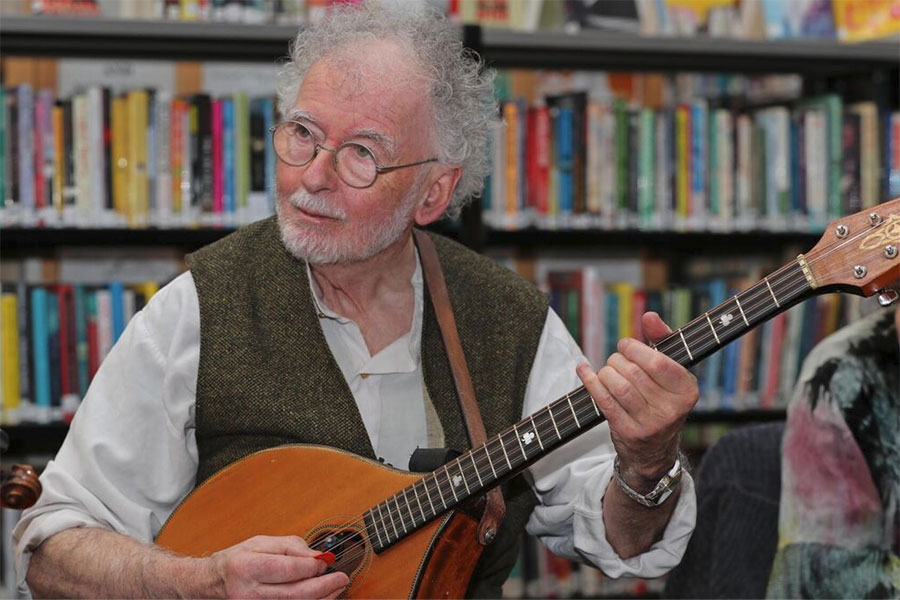
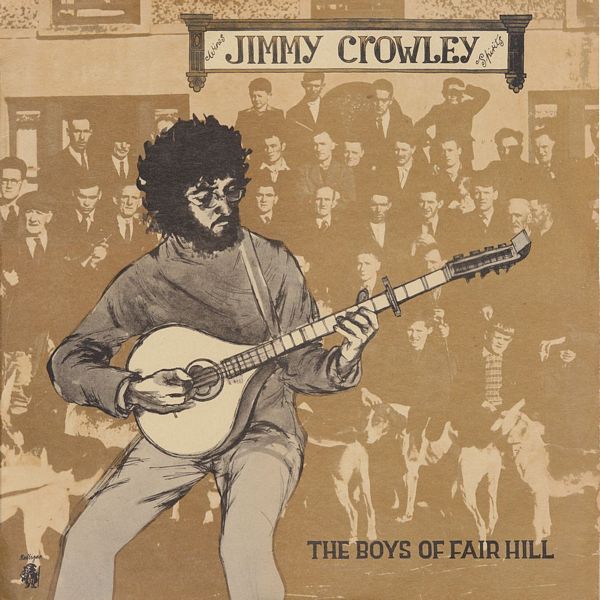 |
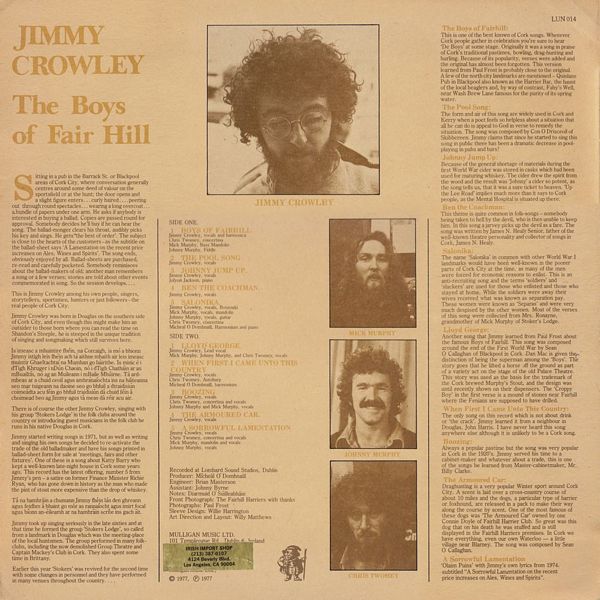
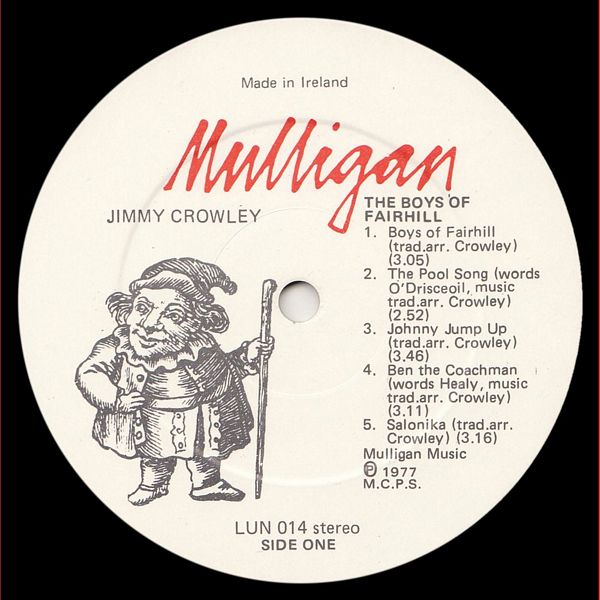
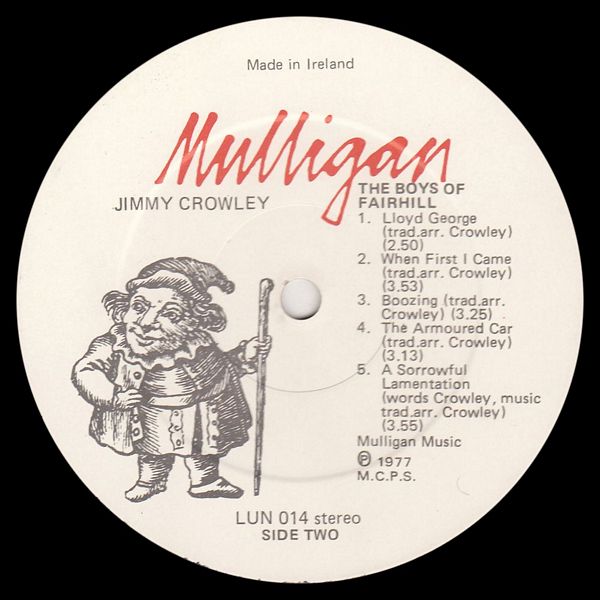 |
Sleeve Notes
Sitting in a pub in the Barrack St. or Blackpool areas of Cork City, where conversation generally centres around some deed of valour on the sportsfield or at the hunt; the door opens and a slight figure enters … curly haired … peering out through round spectacles … wearing a long overcoat … a bundle of papers under one arm. He asks if anybody is interested in buying a ballad. Copies are passed round for approval. Somebody decides he'll buy if he can hear the song. The ballad-monger clears his throat, audibly picks his key and sings. He gets 'the best of order'. The subject is close to the hearts of the customers — as the subtitle on the ballad-sheet says 'A Lamentation on the recent price increases on Ales, Wines and Spirits'. The song ends, obviously enjoyed by all. Ballad-sheets are purchased, re-read and carefully pocketed. Somebody reminisces about the ballad-makers of old; another man remembers a song or a few verses; stories are told about other events commemorated in song. So the session develops.
This Jimmy Crowley among his own people, singers, storytellers, sportsmen, hunters or just followers — the real people of Cork City.
Jimmy Crowley was born in Douglas on the southern side of Cork City, and even though this might make him an outsider to those bom where you can read the time on Shandon's Steeple, he is steeped in the unique tradition of singing and songmaking which still survives here.
Is imeasc a mhuintire fhéin, na Corcaigh, is mó a bhionn Jimmy istigh leis fhéin ach tá aithne mhaith air leis imeasc muintir Ghaeltachtaí na Mumhan go háirithe. Is minic é i dTigh Khruger i nDún Chaoin, nó i dTigh Chatháin ar an mBuailtín, nó ag an Muileann i mBaile Mhúime. Tá ard-mheas ar a chuid ceoil agus amhránaíochta ins na háiteanna seo mar tuigeann na daoine seo go bhfuil a dtraidisiún coimeádta acu féin go bhfuil traidisiún dá chuid féin á choimead beo ag Jimmy agus tá meas dá ré ir acu air.
There is of course the other Jimmy Crowley, singing with his group 'Stokers Lodge' in the folk clubs around the country or introducing guest musicians in the folk club he runs in his native Douglas in Cork.
Jimmy started writing songs in 1971, but as well as writing and singing his own songs he decided to re-activate the trade of the old balladmaker and have his songs printed in ballad-sheet form for sale at 'meetings, fairs and other fixtures'. One of these is a song about Katty Barry who kept a well-known late-night house in Cork some years ago. This record has the latest offering, number 5 from Jimmy's pen — a satire on former Finance Minister Richie Ryan, who has gone down in history as the man who made the pint of stout more expensive than the drop of whiskey.
Tá na hamhráin a chumann Jimmy fhéin lán den ghreann agus feidhm á bhaint go mór as rannaiocht agus imirt focal agus bíonn an-éileamh ar na hamhráin scríte ins gach áit.
Jimmy took up singing seriously in the late sixties and at that time he formed the group 'Stokers Lodge', so called from a landmark in Douglas which was the meeting-place of the local huntsmen. The group performed in many folk-clubs, including the now demolished Group Theatre and Captain Mackey's Club in Cork. They also spent some time in Brittany.
Earlier this year 'Stokers' was revived for the second time with some changes in personnel and they have performed in many venues throughout the country …
The Boys of Fairhill — This one of the best known of Cork songs. Wherever Cork people gather in celebration you're sure to hear 'De Boys' at some stage. Originally it was a song in praise of Cork's traditional pastimes, bowling, drag-hunting and hurling. Because of its popularity, verses were added and the original has almost been forgotten. This version learned from Paul Frost is probably close to the original.
A few of the north city landmarks are mentioned — Quinlans Pub in Blackpool also known as the Harrier Bar, the haunt of the local beaglers and, by way of contrast, Fahy's Well, near Wash Brew Lane famous for the purity of its spring water.
The Pool Song — The form and air of this song are widely used in Cork and Kerry when a poet feels so helpless about a situation that all he can do is appeal to God in verse to remedy the situation. The song was composed by Con O Drisceoil of Skibbereen. Jimmy claims that since he started to sing this song in public there has been a dramatic decrease in poolplaying in pubs and bars!
Johnny Jump Up — Because of the general shortage of materials during the first World War cider was stored in casks which had been used for maturing whiskey. The cider drew the spirit from the wood and the result was 'Johnny' a cider so potent, as the song tells us, that it was a sure ticket to heaven. 'Up the Lee Road' implies much more than it says to Cork people, as the Mental Hospital is situated up there.
Ben the Coachman — This theme is quite common in folk-songs — somebody being taken to hell by the devil, who is then unable to keep him. In this song a jarvey picks up the devil as a fare. The song was written by James N. Healy Senior, father of the well-known theatre personality and collector of songs in Cork, James N. Healy.
Salonika — The name 'Salonika' in common with other World War I landmarks would have been well-known in the poorer parts of Cork City at the time, as many of the men were forced for economic reasons to enlist. This an anti-recruiting song and the terms 'soldiers' and 'slackers' are used for those who enlisted and those who stayed at home. While the soldiers were away their wives received what was known as separation pay.
These women were known as 'Separas' and were very much despised by the other women. Most of the verses of this song were collected from Mrs. Ronayne, grandmother of Mick Murphy of Stoker's Lodge.
Lloyd George — Another song that Jimmy learned from Paul Frost about the famous Boys of Fairhill. This song was composed around the end of the First World War by Seán O Callaghan of Blackpool in Cork. Dan Mac is given the distinction of being the superman among the 'Boys'. The story goes that he lifted a horse off the ground as part of a variety act on the stage of the old Palace Theatre. This story was used as the basis for the trademark of the Cork brewed Murphy's Stout, and the design was until recently shown on their dispensers. The 'Croppy Boy' in the first verse is a mound of stones near Fairhill where the Fenians are supposed to have drilled.
When First I Came Unto This Country — The only song on this record which is not about drink or 'the crack'. Jimmy learned it from a neighbour in Douglas, John Harris. I have never heard this song anywhere else although it is unlikely to be a Cork song.
Boozing — Always a popular pastime but the song was very popular in Cork in the 1920's. Jimmy served his time to a cabinet-maker and whatever about a trade, this one of the songs he learned from Master-cabinetmaker, Mr. Billy Clarke.
The Armoured Car — Draghunting is a very popular Winter sport around Cork City. A scent is laid over a cross-country course of about 10 miles and the dogs, a particular type of harrier or foxhound, are released in a pack to make their way along the course by scent. One of the most famous of these dogs was The Armoured Car' owned by one Connie Doyle of Fairhill Harrier Club. So great was this dog that on his death he was stuffed and is still displayed in the Fairhill Harriers premises. In Cork we have everything, even our own Waterloo — a little village near Blarney. The song was composed by Seán O Callaghan.
A Sorrowful Lamentation — 'Olaim Puins' with Jimmy's own lyrics from 1974. subtitled "A Sorrowful Lamentation on the recent price increases on Ales, Wines and Spirits".